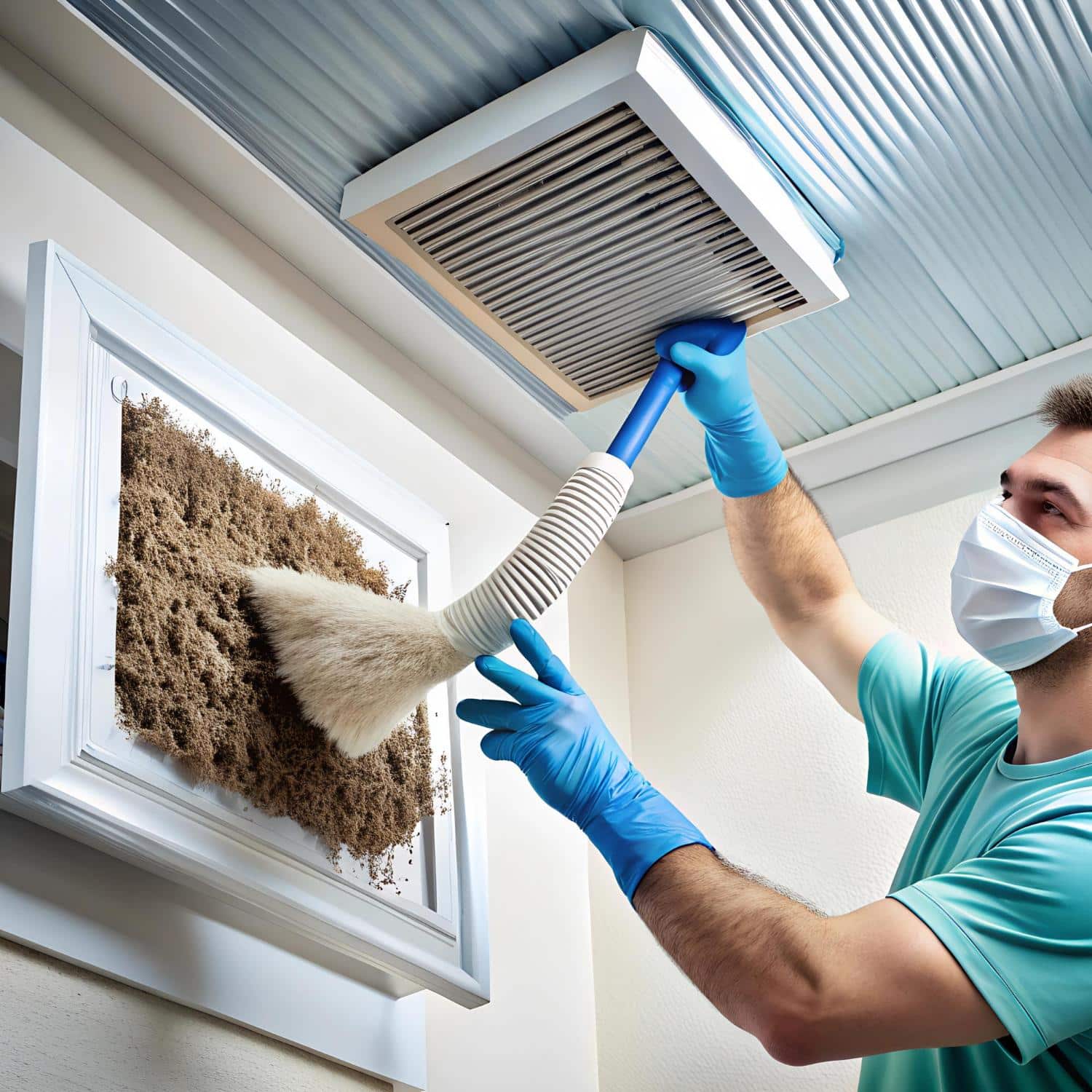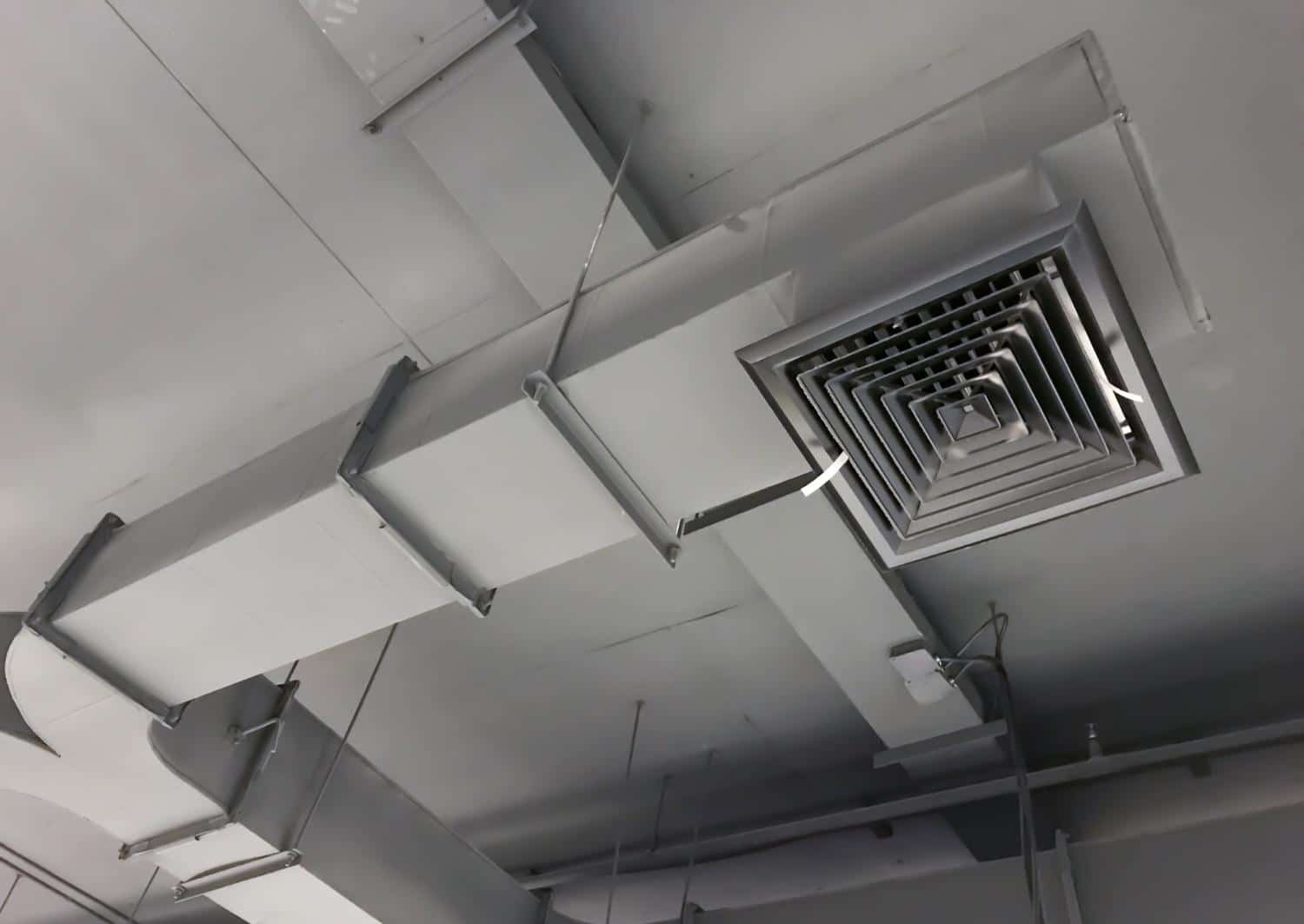Ductwork is the system of air ducts that carries heated or cooled air throughout your home. While it’s often out of sight, it plays a crucial role in maintaining a comfortable indoor environment.
Unfortunately, your ductwork can accumulate dust, debris, and contaminants over time, which can affect air quality, HVAC system efficiency, and even your health.
But how do you know when it’s time to get your ductwork cleaned? Below, we’ll cover five clear signs that indicate it’s time to call in professionals to clean your ducts.
1. Dust and Debris Around Vents and Registers
One of the easiest signs to spot is the accumulation of dust or debris around your air vents and registers. While some dust is normal, especially if you haven’t cleaned your home recently, an excessive buildup could signal that your ductwork is dirty.
What to Look For:
- Dusty Vent Covers: If you frequently notice a layer of dust on the vent covers, it could indicate that dust from inside your ductwork is being pushed out into your living space.
- Dirt Around Registers: If you see dirt streaks or a layer of grime around your registers (the part where air enters your rooms), this is another red flag.
- Increased Dust Levels: If it seems like no matter how often you clean, dust keeps accumulating on your furniture or floors, your duct system might be recirculating dirty air.
Why It Matters: Dirty ducts mean dirty air. When debris builds up in your system, it eventually gets circulated through your home every time you turn on your HVAC system. This can negatively affect the indoor air quality, which brings us to the next sign.
2. Poor Indoor Air Quality and Allergy Symptoms
Air quality is directly impacted by the cleanliness of your ductwork. If your home’s air seems stale or if family members experience worsening allergy or respiratory symptoms, dirty ductwork may be to blame.
Common Symptoms to Watch For:
- Increased Allergy Symptoms: Dust, pollen, pet dander, mold spores, and other contaminants can accumulate in your ducts and circulate through the air in your home. If you or your family members suffer from allergies, you may notice more frequent or severe reactions like sneezing, coughing, and runny noses.
- Respiratory Issues: Individuals with asthma or other respiratory conditions may experience worsened symptoms when exposed to poor indoor air quality. A dirty duct system can aggravate breathing difficulties.
- Musty Odors: Foul or musty smells are also a clue that there could be mold or mildew growing in your ductwork, which poses a significant health risk.
Why It Matters: Mold spores, dust mites, and other airborne irritants can significantly decrease your home’s air quality and contribute to long-term health problems, especially for those with pre-existing conditions like asthma. Regular duct cleaning can remove these allergens, improving the overall air you breathe and providing a healthier environment.
3. Inconsistent Airflow or Higher Energy Bills
Your HVAC system relies on clean, efficient ductwork to distribute air evenly throughout your home. When ducts become clogged with debris, it can lead to inconsistent airflow, meaning some rooms may feel too hot or cold compared to others. This imbalance can also result in your HVAC system working harder than it should, which means higher energy bills.

Warning Signs:
- Uneven Heating or Cooling: Are some rooms colder or warmer than others even though the thermostat is set to a consistent temperature? This could be due to blockages or buildup in your ducts that are restricting airflow to certain parts of your home.
- Increased Utility Costs: If your energy bills have suddenly spiked without a significant change in usage patterns, dirty ductwork might be a hidden factor. When debris builds up, it forces your HVAC system to work harder to achieve the desired temperature, leading to more energy consumption.
- Longer HVAC Run Times: If it takes longer for your system to heat or cool your home, or if it cycles on and off more frequently, this is often a sign of a larger issue within your duct system.
Why It Matters: Not only does poor airflow make it harder to maintain a comfortable temperature in your home, but it also puts unnecessary strain on your HVAC system. Over time, this extra wear and tear can shorten the life of your system, leading to costly repairs or even replacement. Regular duct cleaning can help maintain optimal airflow, reducing energy usage and extending your HVAC system’s lifespan.
4. Visible Mold or Signs of Pest Infestations
Mold growth and pest infestations are both serious issues that can have a lasting impact on the health of your home and its occupants. If you’ve noticed any signs of mold or pests in or around your ductwork, it’s important to address the problem immediately.
What to Watch For:
- Visible Mold Growth: Mold thrives in moist environments, and ductwork can sometimes develop condensation, especially if your HVAC system is not properly maintained. You may be able to spot mold growing around vent covers, or you might notice a musty smell in certain rooms.
- Unexplained Health Issues: If anyone in your household has unexplained respiratory issues or other health problems, mold spores in the air could be to blame.
- Pest Droppings or Noises: Rodents, insects, and other pests can find their way into your ductwork. If you hear scurrying sounds in your vents or notice droppings, nests, or gnaw marks, pests may be living in your ducts.
Why It Matters: Mold spores are a significant health risk, especially for individuals with allergies or compromised immune systems. Pests in your ductwork can introduce harmful bacteria and cause physical damage to your HVAC system. Cleaning your ducts can eliminate mold and pests, ensuring a cleaner, safer home environment.
5. Recent Renovations or New Construction in Your Home
Renovations and construction projects often generate a significant amount of dust and debris. Even if your ductwork wasn’t directly involved in the renovation, fine particles can easily find their way into your duct system during the construction process. After a major home project, it’s wise to have your ductwork inspected and cleaned.
Signs After a Renovation:
- Excessive Dust Everywhere: If your home seems dustier than usual after a construction project, your ducts may have accumulated particles like drywall dust, sawdust, and other debris.
- Lingering Odors: Paint, varnish, and other chemical odors from construction materials can get trapped in your ductwork, leading to unpleasant smells circulating in your home long after the project is complete.
- Compromised Filters: HVAC filters can become clogged with construction debris, making it more likely for fine dust and dirt to get into your ducts.
- A whole home humidifier can improve indoor comfort by maintaining optimal humidity levels, especially during dry seasons. However, if not properly maintained, it can lead to moisture buildup within your ductwork. Excess humidity inside ducts creates an ideal environment for mold growth, which can severely impact air quality and pose health risks. If you have a whole-home humidifier, it’s essential to regularly inspect your ducts for signs of mold or mildew. Regular duct cleaning is also recommended to prevent moisture-related problems and ensure that your home’s air remains clean and healthy, while avoiding any long-term damage to your HVAC system.
Why It Matters: Renovation debris can clog your duct system, reducing airflow and forcing your HVAC unit to work harder. Cleaning your ducts after construction is an essential step to maintaining system efficiency and indoor air quality.
Benefits of Regular Duct Cleaning
Now that you understand the signs that indicate it’s time for duct cleaning, it’s also worth considering the broader benefits of maintaining clean ducts. Regular duct cleaning offers a host of advantages that go beyond simply avoiding the negative effects of dirty ducts:
- Improved Air Quality: Removing dust, mold, and allergens from your duct system enhances the quality of the air circulating through your home.
- Energy Efficiency: Clean ducts promote better airflow, allowing your HVAC system to run more efficiently and use less energy.
- Longer HVAC System Lifespan: A well-maintained duct system places less strain on your HVAC unit, reducing the risk of breakdowns and extending its operational life.
- Reduced Allergens and Irritants: Regular cleaning helps to eliminate potential sources of indoor allergens, benefiting individuals with allergies or respiratory conditions.
- Cost Savings: Cleaner ducts mean your system works more efficiently, potentially lowering your energy bills and preventing expensive repairs in the long run.

Air Duct Cleaning: A Vital Step for a Healthy Home
Air duct cleaning involves the removal of dust, debris, mold, and other contaminants from your home’s HVAC duct system. Over time, these particles can accumulate and circulate through your home, negatively impacting indoor air quality and potentially causing respiratory issues.
Professional air duct cleaning improves airflow, enhances HVAC efficiency, and reduces allergens in the air, making your living environment healthier. For homes with pets, smokers, or those who have recently undergone renovations, regular air duct cleaning is especially important to maintain optimal air quality and system performance. It’s a small investment with long-lasting benefits for comfort and health.
When to Schedule Duct Cleaning
So, how often should you have your ductwork cleaned? While there’s no one-size-fits-all answer, most experts recommend cleaning your ducts every 3-5 years or more frequently if you have pets, allergies, or live in a particularly dusty area. After major home renovations or if you’ve noticed any of the warning signs listed above, it’s a good idea to have your ducts inspected by a professional to determine if cleaning is necessary.
Conclusion
Your ductwork plays a crucial role in maintaining the comfort and air quality of your home. However, like any other system, it requires regular maintenance to operate at its best.
If you’ve noticed signs like excessive dust, inconsistent airflow, worsening allergy symptoms, or strange odors, it may be time to get your ductwork cleaned. By keeping your ducts clean, you can ensure a healthier, more efficient home environment for you and your family.
